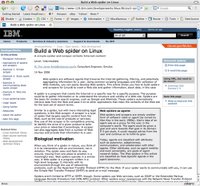Thursday, November 30, 2006
Fake Your Space
I spotted this on Slashdot – for just shy of a dollar a month you can add fake friends to your MySpace or Facebook account. Very scary…. or just a joke site.
Opera Mini

Opera (makers of fine Internet browsers) released version 3.0 of their Opera Mini Browser. I have been experimenting with the new version on my mobile telephone and am very impressed with the results. Opera Mini manages to make surfing the Internet on your ‘phone a more pleasant experience by utilizing a proxy server to pre-process data for you. The end result is smaller downloads and faster page updates.
One of the clever features that Opera has developed is content folding. Long lists (such as navigation elements) have been shrunk and hidden behind a “+” button. Just click on the element to toggle hide/display. This reduces clutter on small screens.
Palm users on Slashdot and other forums have indicated that the software has some flaws on some devices but my experience has been good. I was even able to access MySpace.
The mobile Internet has not really taken off in the United States, hopefully that will change. Opera Mini runs on a multitude of telephones (including some very old models) and installation is quick and painless. If you have a website that you think mobile users might access you would do well to download Opera Mini and test your site.
Wednesday, November 29, 2006
Google Apps for Your Domain

Google has just launched Google Apps for Your Domain. The service offers:
- Start page- Users can access email, calendar, news, weather and more in a single place.
- Email - 2 gigabytes of storage and search tools that help your users find information fast. Instant messaging from right inside their accounts.
- Chat - Users can call or send instant messages to their contacts for free – anytime, anywhere in the world.
- Calendar - Users can organize their schedules and share events and calendars with others.
- Domain web pages - Administrators can create simple web pages and publish them to your domain.
These are services that Google has offered in the past but the interesting angle is that Google now allows you to use your domain (rather than xxx@gmail.com). So far the service is free but I get the impression that this may grow into a revenue stream for Google.
Well worth investigating.
Tuesday, November 28, 2006
Search Engine Optimization (SEO) Seminar

I am presenting a Search Engine Optimization (SEO) Seminar at DePaul University on Friday, March 16, 2007. The registration page has just gone live and we are waiting to see what the interest is.
I will be writing the content shortly and the featured topics will include:
- Major search engines (such as Google, Yahoo and MSN)
- How search engines and directories work
- The importance and use of keywords and key phrases
- Search engine terminology and jargon
- How to get search engines to index your websites
- How to check how search engines are indexing your site
- How to implement and use website statistics
- Best practices writing for the Web
- HTML coding best practices (including appropriate use of meta tags, keywords, alt text, anchor text, robots.txt, naming conventions and semantic organization)
- Inbound links
- Linking strategy
- Blogging
- SEO strategies to avoid
- Paid search (pay-per-click, Google Adwords, etc.)
Featured Site: Audiosnacks

AudioSnacks is a community site where tourists and travelers can download audio podcasts. It is a perfect place to go just before you jet off to a new city or head down to the museum.
Michael Salvatore (Audiosnacks CEO) was a participant in my Practical Internet Marketing class and used the opportunity to hone his marketing skills and promote the Audiosnacks site. Have a look and find an audio tour:
AudioSnacks: Podcast and MP3 Audio Tours for Travel, Museums and More!
Wednesday, November 15, 2006
Build a Web spider on Linux

M. Tim Jones has written a useful article on building a Web spider which can be found on IBM’s website. Spiders are programs that craw the Web and gather information. Search engines use spiders to build their search databases.
The article has some additional resources that are worth reading. Of particular note is an article that suggests several ways to protect yourself from the e-mail harvesting spiders that collect e-mail addresses for spammers.
Subscribe to:
Posts (Atom)


